Ricky Gervais on guitar playing and his real Life On The Road
Comedian looks back as he revives David Brent for new film
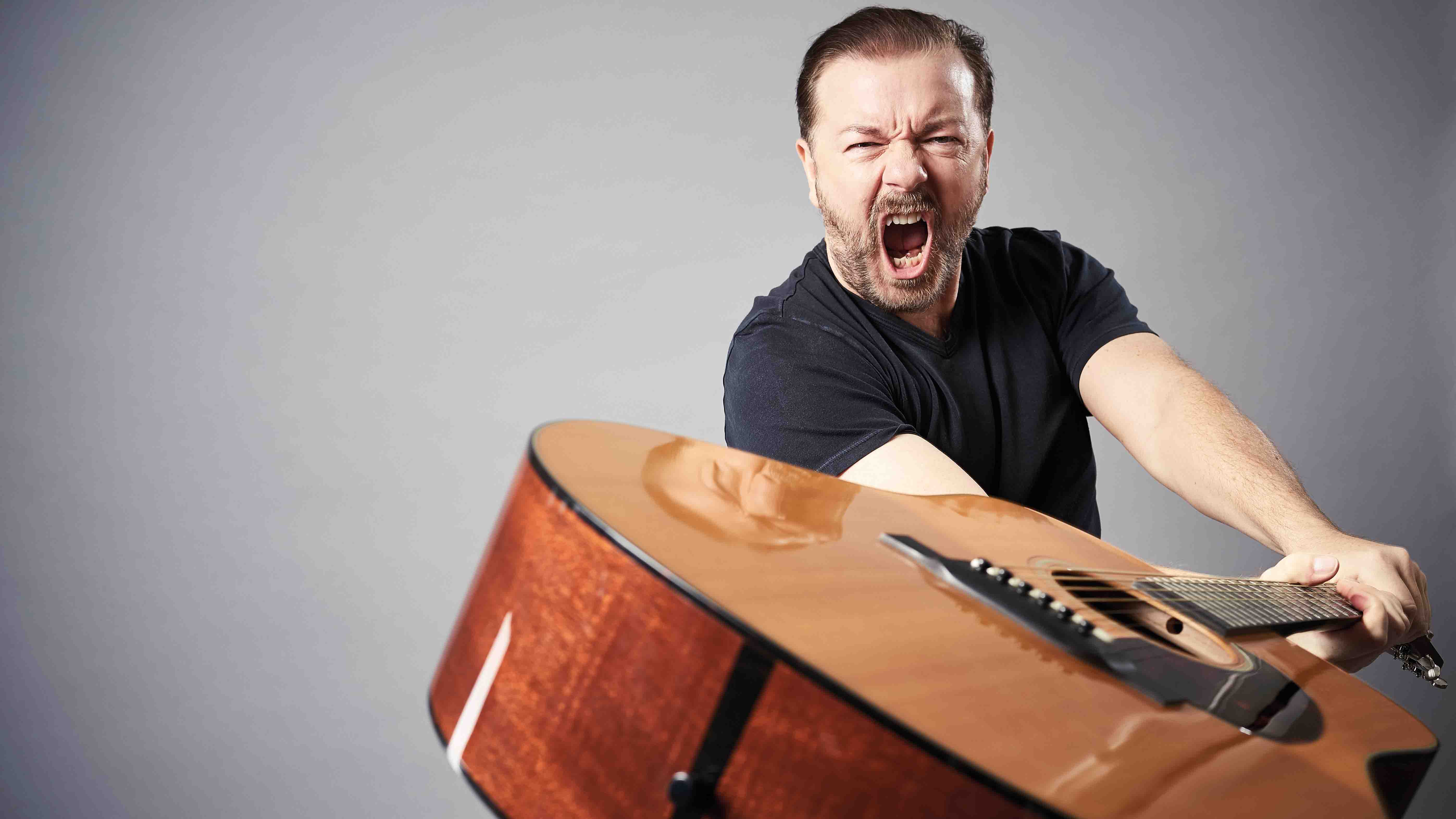
Life On The Road
Ricky Gervais is in good spirits. We’re at his London office for a photo shoot and interview in the run-up to the release of new film/album/songbook Life On The Road, where Gervais’ self-conscious, deluded, yet somehow lovable character David Brent – now working as a sales rep for Slough-based commercial cleaning supplies company Lavichem – turns his hand (and finances) to becoming a rock star.
Gervais himself is no stranger to rock star aspiration, having had a brush with pop success in the early 80s, before becoming one of the most successful comedians the UK has ever produced. From the moment he picked up the guitar to sing Freelove Freeway in The Office, to his 2013 ‘Learn Guitar With David Brent’ YouTube series – it’s clear that Ricky Gervais loves playing guitar.
And despite the humble self-deprecation (“I was probably as good after six months as I am now”), he’s a pretty capable player, proved as we watch him neatly fingerpicking Brent’s folk odyssey, Lady Gypsy during our shoot.
After he switches between Ricky Gervais/David Brent poses with the Martin and Gibson guitars we’ve brought, his trademark cackling laugh never far away, Ricky takes a seat at his desk, feet up and crossed in the classic Brent stance. The recorder is rolling and our interview starts. Go and get the guitar…
When did you start playing the guitar, and who influenced you to pick it up?
“Well, I suppose famous people that influenced me were the folk singers – Cat Stevens I’d have to say. I think the first song I ever learnt to play was off the Teaser And The Firecat album, How Can I Tell You, I think. E minor, A, D, G!
“But I don’t know why I started learning guitar as opposed to piano, it just seemed like the obvious thing. I started learning at about 13. So about 1974, and there was no question about what instrument you started learning in 1974!
I remember f**king punching it and biting it and throwing it across the f**king room when I couldn’t hold down a f**king chord
“I remember I went down to get it, my mum bought me it. It was nylon[-strung]. Presumably the cheapest one we could afford, I think it was £10 from the music shop in the centre of Reading. I taught myself. For six months I remember fucking punching it and biting it and throwing it across the fucking room when I couldn’t hold down a fucking chord or something. Then as soon as I got the basics – typical of me – I never progressed really. I just got good at those chords I liked. Like B was too hard, barre chords are too hard.
“I didn’t play for years and when I revisited it with adult hands and callouses it was slightly easier. But my 13 year-old little never-done-a-day’s-work-in-their-life hands, honestly… I remember I used to have to sneak up from practice and go [through gritted teeth] ‘Argh! Why can’t I f’cking do this chord?!’”
Have you ever watched 'The World’s Angriest Guitarist' video?
“Fucking hilarious! His mate going, ‘Just have another go!’ Then you just see it smashed! That was me at 13. But I did it quietly, because I was embarrassed. If I can’t do something straight away then I just forget about it, but I got good pretty quick, and I did it so that I could start playing around writing my own songs. I was writing terrible songs from about the age of 14.
“But yeah, everything I do sounds like folk or country, because when your staple is C, F, A minor, G… When I discovered you could throw in an E minor, wow!”
That’s the bridge…
“[Laughs] Yeah! Exactly.”
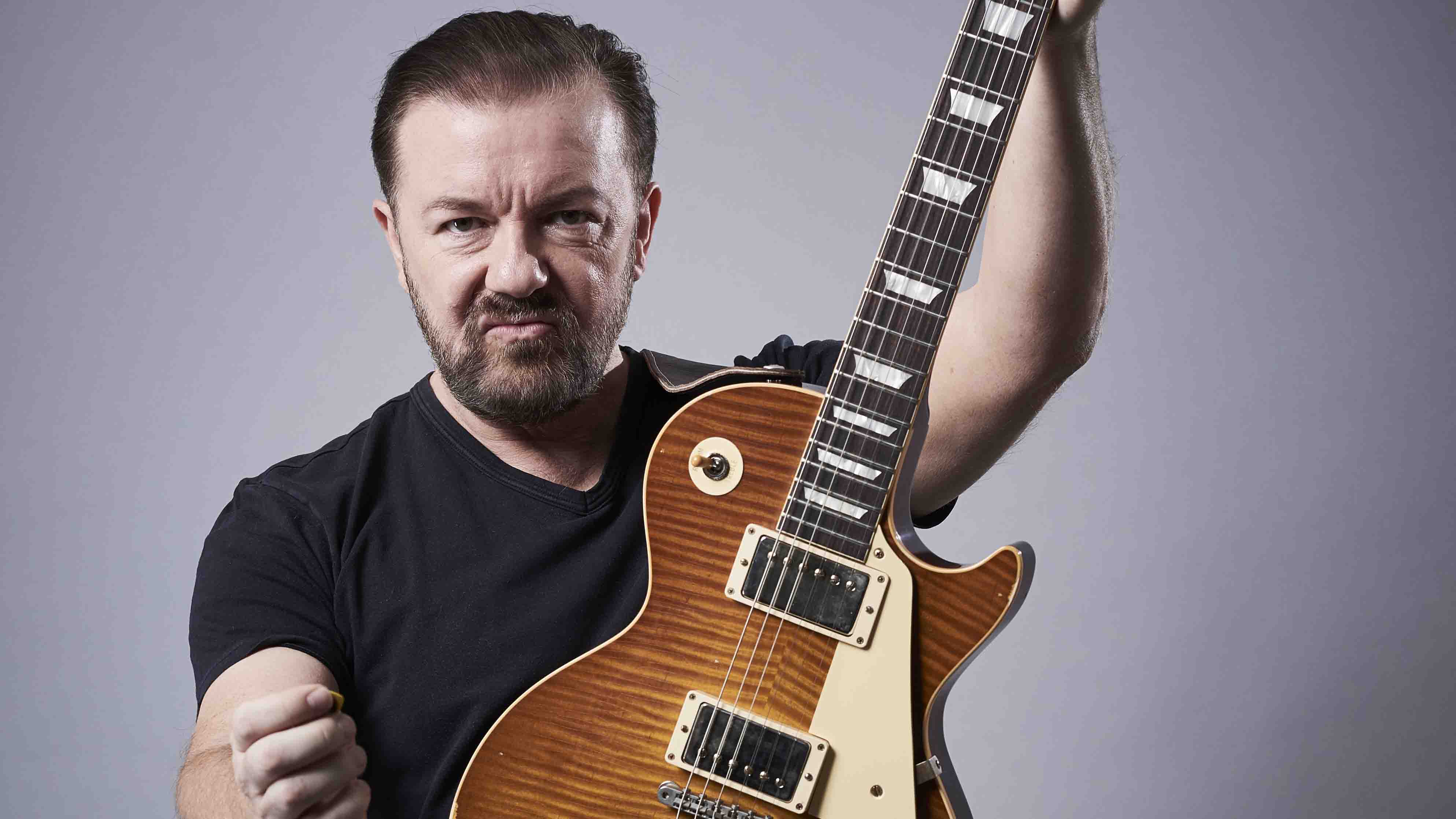
Be our Guest
So you were inspired by songwriters rather than ‘guitar heroes’?
“Yeah, everything I did was to create. I’ve always sort of taught myself to do everything, and I don’t know why. I taught myself to play tennis with a racket against a wall, secretly after school. I think a lot of it all came from poverty. I mean, what kid in Reading could afford guitar lessons… or tennis lessons? I mean, fucking playing tennis in Reading alone you got odd looks!
“And then it’s laziness, I’m the sort of guy who doesn’t open the manual to a thing. I’ll just go [frustrated] ‘How’s this fucking put together?’ It’s poverty, laziness, and wanting to create something that had no habits.
“I create for fun. It’s not like everything I do is lucrative. I didn’t know it could be a job. I am the person who wrote poetry and hid it in the drawer. I thought I’d get a real job and that’s how I’d make my money. So I do it because I feel like I’ve got to do something.”
Do you play electric at all, or has it always been acoustic?
“It’s always been acoustic; with electric, I always worry that me, a 55-year-old comedian with the same haircut for 20 years… it always looks slightly like Tony Blair!
Christopher Guest gave me an electric guitar for my 50th birthday. It’s the one he plays at the scene at the soundcheck when Jeanine walks in. It’s incredible. I f**king nearly cried when he gave it to me
“The thing is, the electric I’ve got, I’m torn on whether to play it and enjoy it, or just look at it and keep it because Christopher Guest gave it to me for my 50th birthday. It’s the one he plays at the scene at the soundcheck when Jeanine walks in. It’s incredible. I fucking nearly cried when he gave it to me.
“So yeah… it’s that thing where you just want to look at it. That’s Spinal Tap innit, ‘Don’t even look at that one!’ [laughs]”
Go off and have a bite…
“Ha-ha! ‘You’ll still be hearing that one’! Oh god… [laughs] It’s such an amazing movie isn’t it? It’s ridiculous! The first time I saw that I thought, ‘No-one will like this as much as me’ – and of course I was wrong. Everyone loves it because it’s brilliant.
“I loved it for the realism as well, I’ve been in bands like that. But it’s just so gentle and sweet. One sketch to the next. If I’m flicking around and it’s on, I’ve got to watch it. He [Guest] doesn’t remember half of it, because it was all ad-libbed.”
You’ve spoken about your love of This Is Spinal Tap before; how much did it play a part in Life On The Road?
“Well, I’ve sort of come full-circle. It’s weird because, this film, I didn’t think about Spinal Tap. But it was a huge influence on The Office, even though that was about paper and theirs was about music. Just the naturalism and stupidity being a thing, and it being a fake documentary – although Chris never looked directly at the lens.”
Those glances at the lens capture Brent at his best…
“Exactly, and it brings it home to you that he’s a real person. He’s been caught out and you feel his pain. It’s that excruciating social faux pas that I want people to feel. Because most of the time we’re not embarrassed for ourselves, we’re embarrassed for other people. I see someone fall over, and I pretend I haven’t seen it, because I think [acknowledging it] makes it worse.
“But the music thing is purely organic, and came from me being a failed musician. In one episode of The Office I thought it’d be funny and inappropriate that David Brent is meant to be in charge, but he looks like somebody at a party who gets a guitar and goes, ‘I’ve got a song’ and you go, ‘Oh please just don’t fucking play a song at a party.’ That’s the end of the party when someone gets a guitar out, un-ironically and starts singing their own songs.
“Unless you’re Bob Dylan, you’re not allowed! So in a round-about way it comes back to some sort of weird convergent evolution where I’m now doing a fake documentary about a band. Although it’s very different; you hit the ground running with Spinal Tap. They’re an historic band who have fallen on bad times and are out of touch. Whereas Brent has fallen on bad times, is out of touch and suddenly decides he wants to be a rock star. So it’s different enough, and it’s of today.”
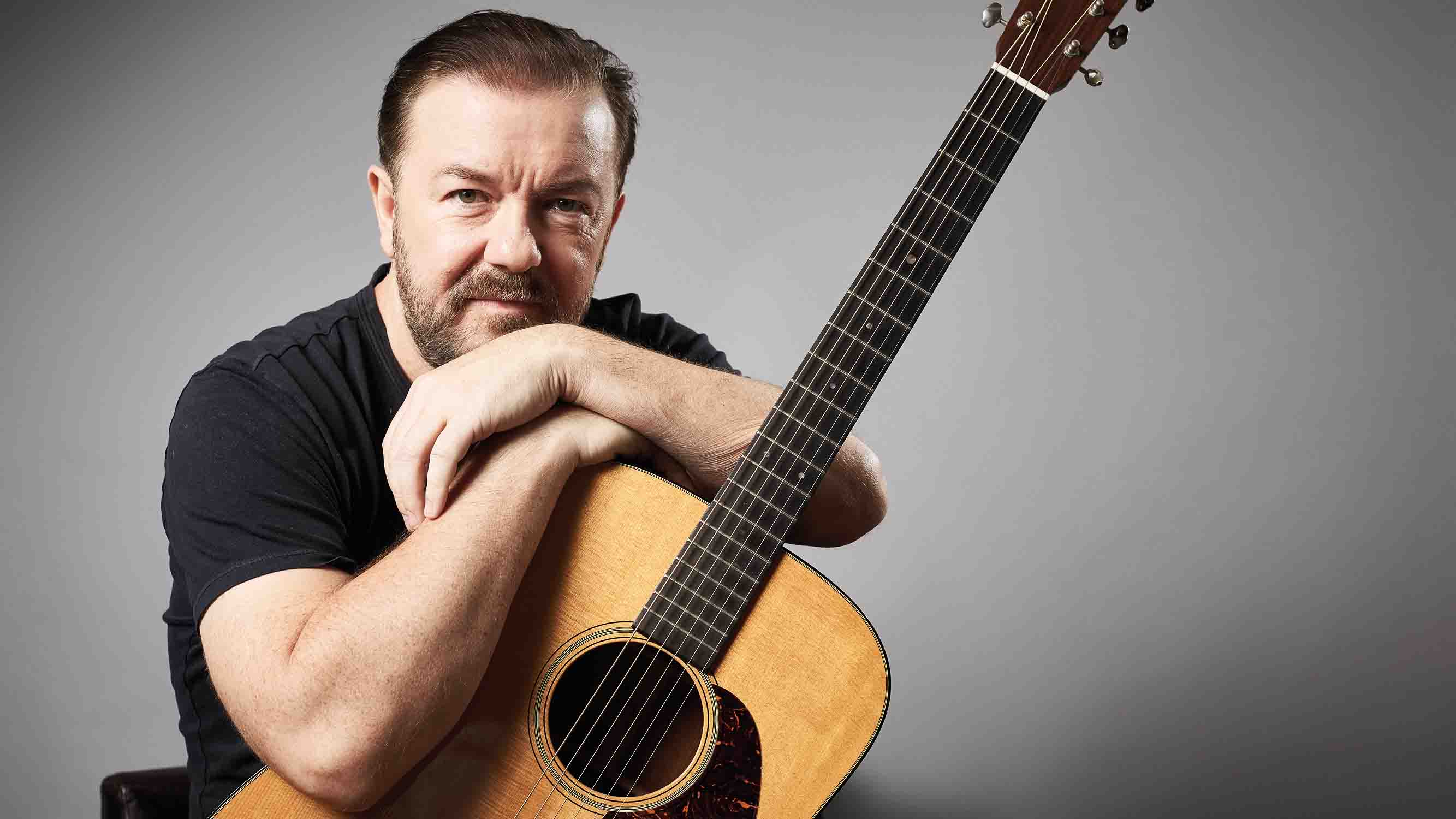
Once you pop…
Not everyone will know about your pop career, either…
“Yeah, I mean, firstly ‘pop career’ is a huge exaggeration! I think people know about it now because I’m famous for something else. There’s one video and a couple of pictures that Graham Norton or Jimmy Fallon show. ‘Look at Gervais when he was young and thin’ That’s the joke!
“It started and ended in a year: 1983 we got signed off a demo tape, released a single that didn’t quite make it. We released another single, it didn’t quite make it and we were dropped. Done. That was the end.”
Do you look back on it fondly?
“Well, I look back on it as a lesson because I didn’t want to be a pop star; I should have wanted to be a musician. So I brought that with me when I started [doing comedy], I didn’t want to be a celebrity, I wanted to be a writer and a director.
“So it did teach me a lesson. It’s almost like another time, you know? When you’re 18… I’m 55 now, it’s like I’m a completely different person. But it is funny, I still look back and think, ‘God, you had hair. You had cheekbones!’
“So it was very quick, and then I tried a few different bands, and that was much more like the Brent thing; playing the pubs and clubs, and trying to get an A&R man along way too early! It went from, ‘We’re doing something special and there’ll be a bidding war’ to ‘There must be one A&R man out there who we can con!’
“Those years had a bigger influence on the film. The real things when you’re in bands, all those arguments and pushing…
“I remember one band I was in with this guy who I’m still friends with. We were going to do a student gig and we had a shopping trolley we got from Safeway’s that we had all of our equipment in. We’re pushing it down the road and he goes, ‘This is my lowest ebb!’ We started just crying with laughter that we’re going to a gig wanting to be rock stars and we’re pushing our fucking equipment in a Safeway’s trolley to get 50 quid and play to no-one!”
Every aspiring musician can relate to stories like that…
[After soundcheck] the guy said, ‘You might as well stay up there lads.’ I asked him what time the doors opened and he said, ‘The doors are open, no-one’s come through’
“I’ve got so many memories of just… tragedy! The scene in the film is based on a real story. We played The Bull And Gate, and [after soundcheck] the guy said, ‘You might as well stay up there lads.’ I asked him what time the doors opened and he said, ‘The doors are open, no-one’s come through.’
“So I said, ‘Let’s just treat it like a free rehearsal’ and we played 10 songs to no-one. He gave us 10 quid out of sympathy. I don’t think it even paid for the cab! That’s the thing, my real bands and my real songs and names without irony are so much more embarrassing than the David Brent things!”
At least there’s awareness with Brent…
“Exactly! There’s an irony! Nah… they weren’t that bad. But there was no chance. There’s a thousand bands starting everyday, so why do you think you’ll be the one? But you should always think like that otherwise why are you doing it at all?
“The funny thing is, 30 years ago I’d have killed to have been being interviewed by Total Guitar… Where were you when I meant it?! [laughs]”
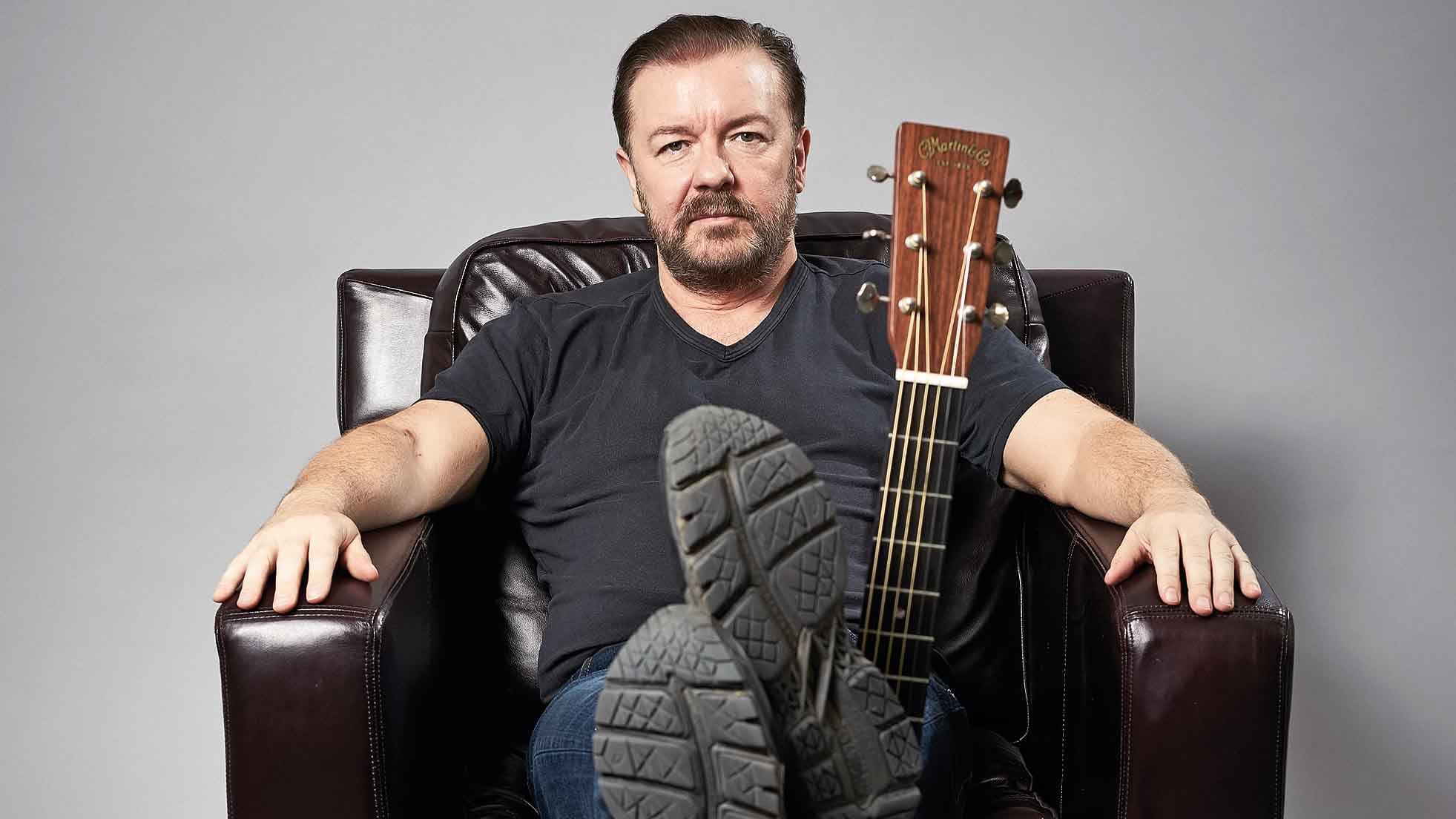
The fame game
Did you see Britain’s Best Part-Time Band with Rhod Gilbert recently?
“Ah, no? Oh god, I love things like that. When it’s real and you can… Oh god, you can taste the tragedy! Have you seen Anvil! [The Story Of Anvil]? The pathos, when his sister gives him her life savings to make the album and she’s just crying. Because she knows she’s never gonna see the money again. It’s too much.
“But yeah, I embrace that tragedy of Brent, a 55-year-old rep who wants to be a rock star, and I’m on his side because he’s been sold a lie since The Office. It originally came out of those quaint docu-soaps where ordinary people got their 15 minutes of fame and now they’ve got a DVD to show the kids. But now fame is different: it’s insatiable and people live their life like an open wound to be famous.
There’s no difference now between fame and infamy. No-one wants to learn guitar six hours a day to be famous
“Since The Office, we’ve seen The Apprentice where people get on there by saying, ‘I will destroy anyone who stands in my way’. There’s no difference now between fame and infamy. No-one wants to learn guitar six hours a day to be famous.
“So you’ll see with Life On The Road compared to The Office, that you’ll like Brent more. He hasn’t changed much – a little bit – but the world’s changed around him. Now he’s the nicer guy in the office, surrounded by alpha males.
“And it’s more tragic: being 55 and a sales rep and wanting to be a rock star is worse than being 39 and a boss and wanting to be a rock star. The lie he’s been sold is that Simon Cowell will give him happiness if he wins Britain’s Got Talent. That’s the new A&R man. A panel of millionaires sniggering at you.”
Could Brent ever be happy just playing in a pub covers band?
“Well, Brent is simply looking for affirmation. But it’s that lie: ‘I’m worthless if I’m not on telly’. He could be happy, if he just realised that fame doesn’t equal happiness. That’s his worst crime. He mistakes popularity with respect. We all want respect, but it doesn’t have to be by a vote. You can fucking respect yourself. That’s the theme, I suppose.”
Have you ever encountered a Brent-like character in a band?
“They’re all a little bit Brent, because I think people make the mistake that if you’re doing something cool, then it’s alright. But I think that someone who collects Harley Davidsons, or tattoos or Jack Daniels bottles, they’re as much of a nerd as someone who collects stamps! We’re all nerds, we all like things, but people don’t think, ‘Oh, I’d better not talk about my Harleys…’ They think that’s cool. But so do people who collect stamps.
“Passion is passion, and it doesn’t matter if you’re passionate about Lord Of The Rings…I couldn’t be less interested. But I think, ‘Good luck to ’em.’ So I embrace all types of nerds. I love seeing a group of trainspotters getting on. I think, ‘Good, they’ve found each other.’ Although I do want to say, ‘You’ve met each other now - you can just go to the pub!’”
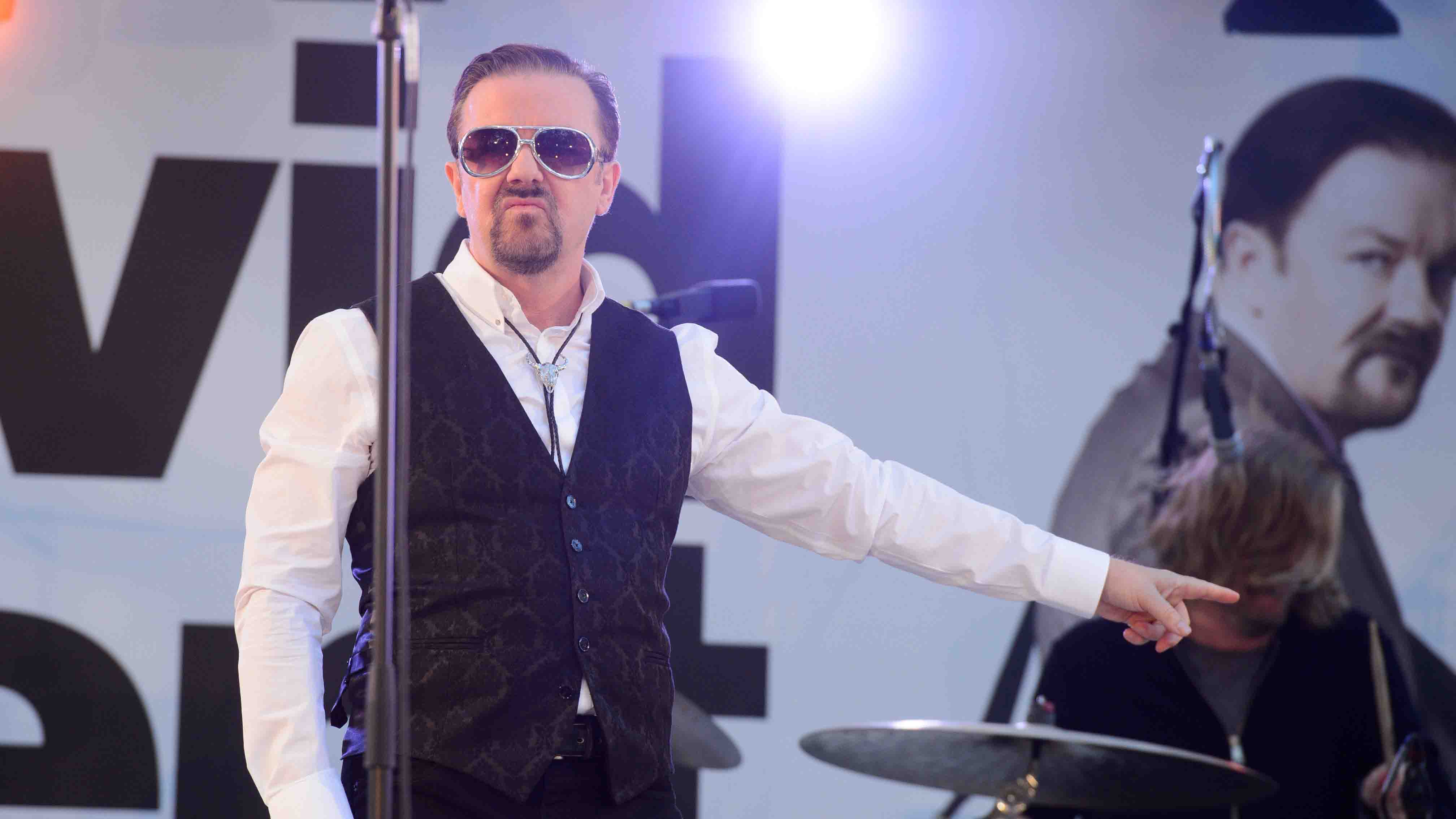
Foregone Conclusion
How did you find the musicians for Brent’s band, Foregone Conclusion?
“That was very easy. Once I’d bumped into [former Razorlight drummer] Andy Burrows and told him the idea and he went, ‘Leave it to me!’ I met him on the Jonathan Ross Show years ago. Then when I did the Comic Relief sketch where I brought David Brent back for Equality Street, I had the idea of doing it live.
“It wasn’t a film then, but I thought it’d be funny, and that if I was going to do a Brent resurrection then that’s what Brent would be doing now. It’d preserve The Office, now it’d be something else. I bumped into Andy and told him the idea and he went, ‘I’ve got a great band!’
“But I thought, ‘Hold on though, these are amazing, why would Brent have this amazing band?’ [Snaps fingers] Because he’s paying for it. He’s haemorrhaging cash, and he’s getting the best session musicians to play pubs and he’s losing money!”
And you re-recorded some of the tracks?
“Yeah, you’ve heard Freelove Freeway before, and you get to hear the second verses of Spaceman and Paris Nights, which obviously I wrote in retrospect, and Equality Street, then all the others are new tracks.”
Did you write the original versions in full for the Training Day episode?
“I only wrote them for the episode. I knew we wouldn’t play them all, so I only wrote a verse, then we get interrupted by Dawn, then a verse of Spaceman, interrupted again. I did write all of Freelove Freeway because that was a nice little showpiece. Then I did an ad-lib where I said, ‘We’ve got a political reggae song called Equality Street’ and I thought, ‘I’ve gotta write that song! What would it be?’ It would be exactly what it says on the tin, a street that’s a metaphor to end all prejudice!”
The album is quite eclectic; did you have the different styles in mind writing the songs?
“No, sometimes I’d think, ‘I need another song, what would he sing about?’ And there are two main things he sings about. One is changing the world; he thinks he’s the first person ever to talk about the plight of the Native American. The other is fantasising. So something like Freelove Freeway, or Ooh La La, they’re not comedy songs; it’s the backstory that’s funny. A 55-year-old rep singing about crossing America picking up chicks, which he’s never done, never could do and never will do!
“The only remotely comedy song is Lady Gypsy, where his fantasy is that he’s trying to be 18 again, and then he puts in this inappropriate argument about heather!
“Whenever he’s trying to be on somebody’s side, he accidentally insults them. So he thinks he’s helping the plight of the Native American, but then he accidentally insults them by bringing up scalping! ‘They only scalped when they got real mad.’ He’s got that off fucking cowboy movies! He doesn’t know if that happened or not!
“It’s the same with Slough, it’s an ode to his favourite place, and it’d be a beautiful song if he wasn’t singing about the A4! ‘The motorway runs by your door’ – that’s a terrible place to live, next to a motorway, but he’s saying it’s convenient because he’s a rep! I love the pedestrian nature of it - that the good thing is that it’s equidistant between London and Reading. What could be a better place than being equidistant between London and Reading?!
“The other side of it is that he’s trying to be something he’s not. He doesn’t care about the plight of the Native American, he just thinks that’s cool to write about, and he gets caught out because he doesn’t know the first thing about it. But that’s also a slight against rock stars who think they can just do a fucking song and change the world.
“He tries his best, but he’s childlike, almost. He’s looking for things to write about where people will go ‘wow’… but no-one does, so he has to say it himself. So he says things like, ‘Listen to the metaphor in this song’ or ‘Everything in this song is factually accurate’. Imagine fucking Dylan saying that!? [laughs] I love him.”
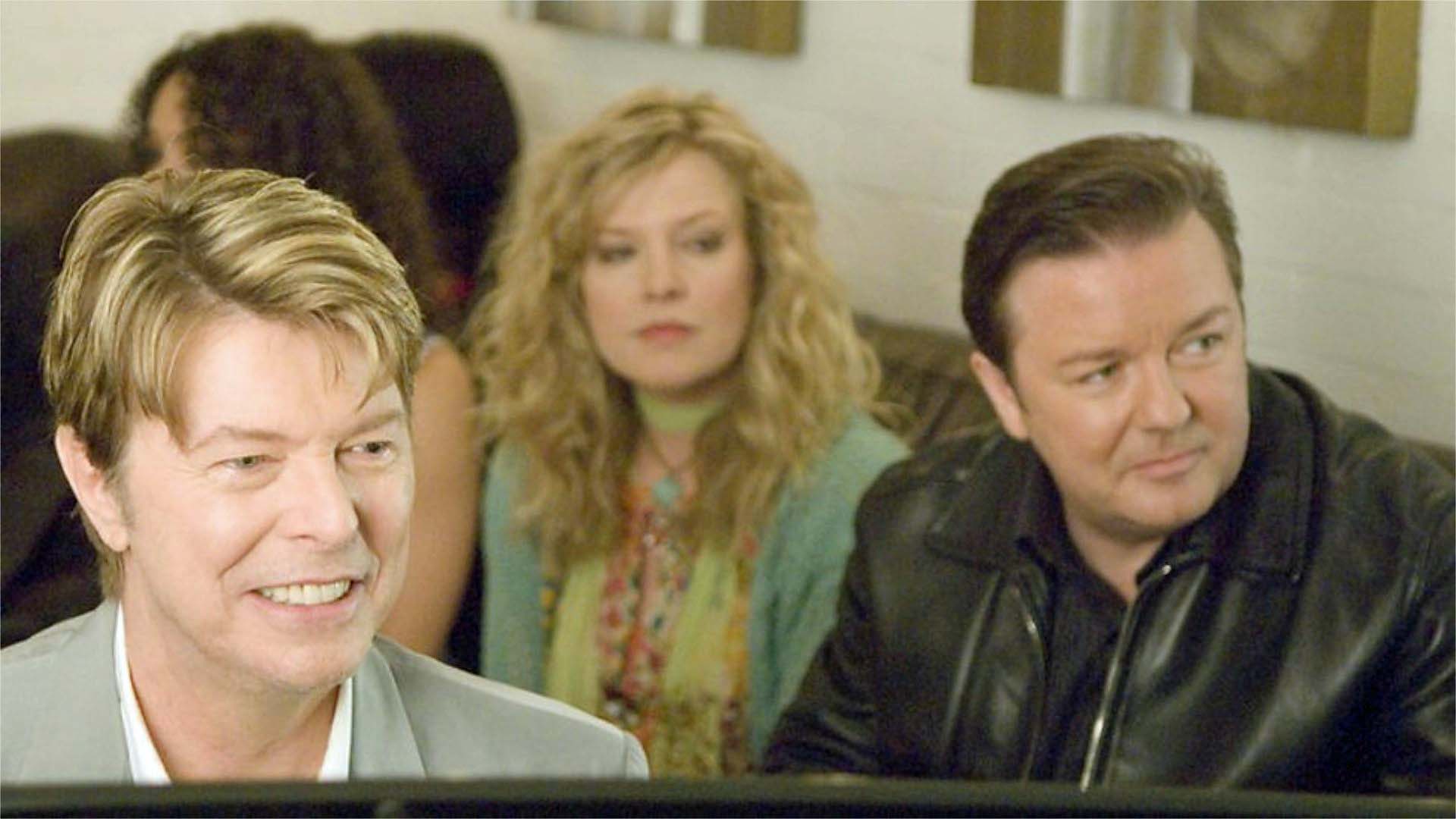
We can be heroes!
Ricky on what it’s like to work with bona fide rock legends…
David Bowie
“Amazing. A hero of mine for 25 years before I met him. I have to pinch myself, and at the time, thinking ‘Oh my god, I’m friends with my musical hero’. But it’s almost like two different people. I sort of didn’t know David Bowie – David Bowie doesn’t exist – I just knew David Jones, the nice, normal man, who just happened to be a brilliant songwriter and rock star.
“I remember when I sent him the lyrics for Pug-nosed Face, [the song Bowie performed on Extras] and I said ‘Can you do something retro, like Life on Mars?’ He went [sarcastically] ‘Oh sure, I’ll just knock off a quick fucking Life On Mars for you...’ I just started laughing. It was just surreal.
“The first time I went to his place in New York, I went in and the concierge said, ‘Oh, you’re here to see Mr Jones?’ And I went, ‘Yeah. Yeah, course I am. Course I’m here to see Mr Jones’. People don’t think of that, you think, ‘It’s David Bowie!’ this fucking rock god, but he’s a guy from Beckingham who got really brilliant at something. He’s amazing.”
Noel Gallagher
“The night before [we recorded Freelove Freeway], I’d played the Palace Theatre and he was there. He came backstage and he went, ‘Ah, that was great’. And I don’t know how it came up - he liked the song, I think - and I said, ‘Oh, I’m recording it tomorrow for the DVD.’ He goes, ‘Can I be on it?’ and I went, ‘Uh…YEAH?!’ and he just came down, and it was amazing.
“He’s great… he’s funny as well. Smart, funny, he just always speaks the truth. The ultimate for a vox pop on any subject is Noel Gallagher.”
Chris Martin
“What a lovely man. Well, again, he was in Extras. I first met him because he was a fan of our XFM shows, and I became mates with him. In the film, Brent says, ‘I’ll probably write a song about this one day. Probably with a Coldplay vibe…’ Because that’s what Chris Martin does – he takes ordinary everyday things and makes them about the universe and electricity and shit!
“And then of course, it’s exactly like a Coldplay song. And that was the gag, that he literally rips off every Coldplay song. He came in, nailed it in 10 minutes. I played it to him and he was just laughing; he got every reference. He said, ‘No, I get it. Let me help you to take the piss out of me!’”
The Life On The Road film and album are out now.
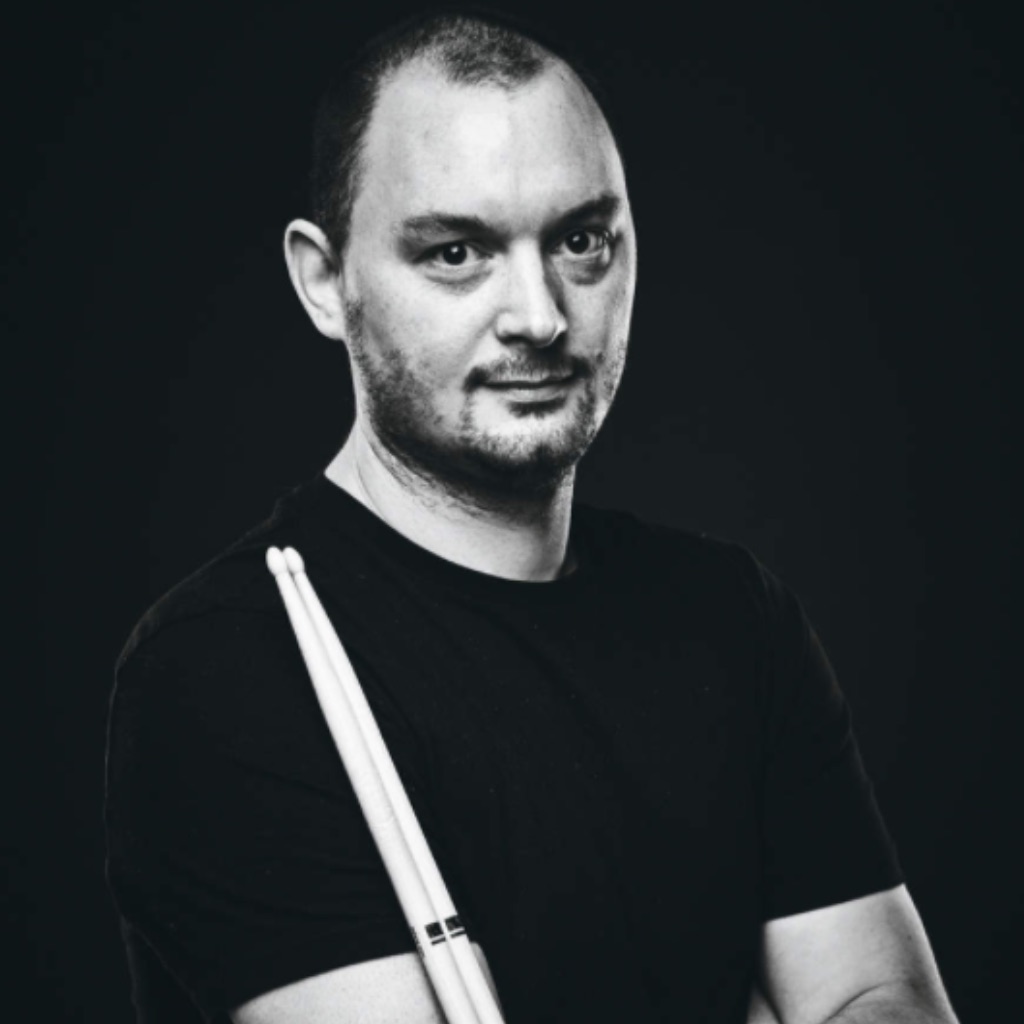
Stuart has been working for guitar publications since 2008, beginning his career as Reviews Editor for Total Guitar before becoming Editor for six years. During this time, he and the team brought the magazine into the modern age with digital editions, a Youtube channel and the Apple chart-bothering Total Guitar Podcast. Stuart has also served as a freelance writer for Guitar World, Guitarist and MusicRadar reviewing hundreds of products spanning everything from acoustic guitars to valve amps, modelers and plugins. When not spouting his opinions on the best new gear, Stuart has been reminded on many occasions that the 'never meet your heroes' rule is entirely wrong, clocking-up interviews with the likes of Eddie Van Halen, Foo Fighters, Green Day and many, many more.

